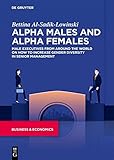Alpha males and alpha females: male executives from around the world on how to increase gender diversity in senior management
Material type: TextPublication details: Walter de De Gruyter GmbH, Berlin 2023Description: 153 pISBN:
TextPublication details: Walter de De Gruyter GmbH, Berlin 2023Description: 153 pISBN: - 9783111169422
- 658.3008 AL
| Item type | Current library | Collection | Call number | Copy number | Status | Date due | Barcode | |
|---|---|---|---|---|---|---|---|---|
 Book
Book
|
Indian Institute of Management LRC General Stacks | Public Policy & General Management | 658.3008 AL (Browse shelf(Opens below)) | 1 | Available | 006827 |
Browsing Indian Institute of Management LRC shelves, Shelving location: General Stacks, Collection: Public Policy & General Management Close shelf browser (Hides shelf browser)

|

|

|

|

|

|

|
||
| 658.3 LAZ Personnel economics in practice | 658.3 PAN Social side of Tata steel | 658.3 PAN Social side of Tata steel | 658.3008 AL Alpha males and alpha females: male executives from around the world on how to increase gender diversity in senior management | 658.3008 FAN Power of difference: | 658.3008 OZS Gender diversity and inclusion at work: | 658.3008 SIN Routledge companion to organizational diversity research methods |
Table of content:
1 The global companies need to harmonise men’s and women’s strengths
Unlicensed 1
2 How men explain the underrepresentation of women in top management
Unlicensed 19
3 Conflicts between alpha men and alpha women
Unlicensed 55
4 Old boys’ networks and business meetings: men’s natural playgrounds
Unlicensed 76
5 Alpha men on successful women’s personality traits and leadership styles
Unlicensed 92
6 Alpha men’s strategies for increasing gender diversity in senior management
Unlicensed 115
7 The global research project behind this book
Unlicensed 140
Acknowledgements
Unlicensed 144
Bibliography
Unlicensed 145
About the author
Unlicensed
[https://www.degruyter.com/document/doi/10.1515/9783111172651/html#contents]
What do international male business leaders have to say about gender diversity, the rise of talented women into management and the opportunities for the sexes to work together harmoniously in boardrooms – as well as the obstacles that stand in the way?
When most people think manager, they think male. Boardrooms around the world are still dominated by ‘alpha’ men and their assertive, decisive leadership styles. Meanwhile, their female counterparts, alpha women, remain underrepresented in almost every country. Many women feel they’ve been excluded and are calling for equality. This book offers a fresh perspective on gender roles that moves away from the old paradigm of male domination and female victimhood. It argues that companies that want to succeed need to productively combine and leverage off the strengths offered by men and women. It covers how mixed leadership teams can be made the norm in international companies. To find some answers, Bettina Al-Sadik-Lowinski interviewed senior male executives from eleven countries. These ‘alpha men’ agree that women and their abilities should be better represented on company boards. They believe the current imbalance is due to a mix of talented women’s reluctance to pursue their career ambitions along with the barriers created by existing power structures. Male managers fear losing face and being shown up by strong women. They want recognition, rather than aggression, from their female colleagues. The interviewees also discuss what they see as women’s strengths, such as their positive, calming influence in male-dominated meetings, and comment on sensitive topics such as #MeToo and the influence of ‘erotic capital’ and ‘old boys’ networks’. The book presents the men’s views in their own words, complemented by alternative perspectives from top female executives.
Al-Sadik-Lowinski’s analysis shows how both sexes can work together in international companies to build a brighter, sustainable future.
Alpha Males and Alpha Females seeks to promote greater equality at senior levels in global companies, with mixed leadership teams made up of both qualified men and qualified women. It gives women who are interested in pursuing a management career an insight into men’s views, as well as advice on their personal career development. And it suggests strategies that executives can adopt to strengthen diversity, build mixed leadership teams and secure their companies’ long-term success.
The reader will learn about key components of diversity strategies for global companies as an outcome of the analysis suggested by male CEO and top executives based on research and best practice.
(https://www.degruyter.com/document/doi/10.1515/9783111172651/html)
There are no comments on this title.
